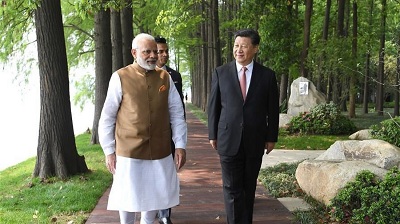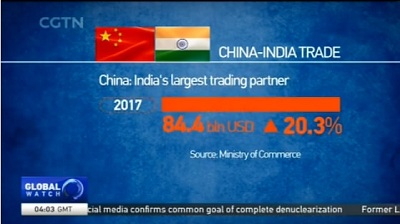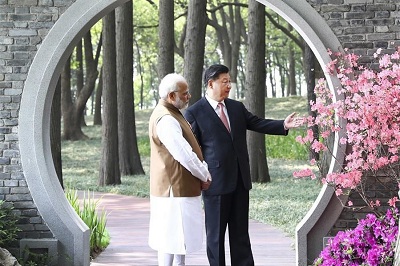
(Photos: CGTN)
As the two largest developing economies in the world, China and India have decided to boost mutual trust and strengthen their ties. In the two-day meetings in Wuhan, Chinese President Xi and Indian Prime Minister Modi have had "heart-to-heart" communications about the two countries' relationship. As the informal summit closed, it seems that Modi's goal of "bridging a trust deficit" has been accomplished successfully.
In an interview with CGTN, Wang Peng, assistant research fellow from the China Research Institute at Fudan University, considers this meeting as an important step not only for China-India relations, but an opportunity for both countries to contribute to the world development.

As the two largest developing countries in the world, China and India are facing similar problems such as unbalanced development. In the meantime, both China and India are beneficiaries of globalization and the open market. The current globalization process led by Western powers is neither fair nor efficient. As the leading developing countries, they shoulder the responsibility of making necessary modifications to the current system, to make the benefits of globalization beneficial to more countries.
Guo Xuetang, director of the Center for South Asia and Indian Ocean Studies at Shanghai University of International Business and Economics, also sees Modi's talks with Xi as an opportunity for both countries to "reset their relationship" in the long term. In an interview with CGTN, Guo points out that the timing of his visit is crucial. With trade skirmish between China and the US, the power struggle between Russia and the US, and the unsettled conflicts in the Middle East, "the world is going to be more unstable and uncertain." India and China have a large role to play in building a more peaceful and open world.

As Xi emphasizes in the meeting with Modi, "the world is going through a critical period of reform…A sound relationship between China and Indian is a crucial driver to the global peace process and significant to the development of humankind." To achieve this goal, the foundation of a China-India relationship should be "mutual trust."
According to the Indian Express, the most important goal of Modi's visit is also to bridge "trust deficit" between two countries. As Wang Peng explains, "trust deficit" does exist but China and India are on a solid beginning to become important strategic partners.
"I do think that we have a gap or what you say the trade deficit between China and India." Wang Peng admitted it in a frank way. The shadow of the Sino-Indian border conflict of 1962 has not vanished completely; and the Donglang standoff last year certainly did not direct the two countries' relationship in a friendly way. Not to mention that media reports often portray China and Indian as head-to-head competitors on the world stage in terms of technology and economic development.
Having said that, Wang Peng is still much excited about the outcome of this candid communication between two leaders, and he is looking forward to more cooperation in the long run. "That's the first time that the two leaders of great powers have come together to talk in a very frank way, that was unimaginable one year ago." He believes that there is still much to be discussed regarding the details of the two countries' strategic cooperation, and the Xi-Modi meeting is just the beginning. "We must continue this atmosphere", Wang added.


